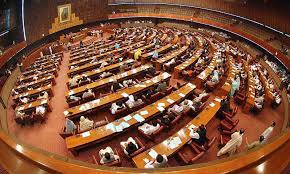A hung parliament emerged in the aftermath of peaceful and smooth nationwide polls, that manifest the countrywide vote bank and ranking of all civic groups and present traditional public approval of major political parties in the country.
The Pakistan Tehreek-e-Insaf (PTI)-backed candidates are leading with more than 90 seats to their name, while the PML-N is trailing behind. The PPP retained the status of the country’s third-largest political party, followed by the MQM-P, the JUI-F, and other ethnic or religious groups. As of today, no single party can form its sovereign government, while a coalition government will be formed by two or more parties through a mutually agreed power-sharing mechanism to rule the country for the next five-year term.
The Pakistan Tahreek-e-Insaf (PTI ), has appeared to be the biggest political group in the aftermath of the election-2024, as the PTI-backed independent candidates brought the highest scores in the National Assembly. The PTI leadership ruled out allying with the PML-N or Pakistan Peoples Party to form the federal government. Despite receiving popular support from the masses, the PTI leadership did not acknowledge other parties’ mandate accusing the ECP and state institutions of manipulating the election results against the party.
The PTI leaders claim to form an independent government however, no effort or activity has been seen in that regard so far. Meanwhile, Nawaz Sharif, the PML-N Supremo and party’s candidate for the premiership gave a victory speech on Friday and jubilated his party’s performance in recent Elections. According to Nawaz, the PML-N respects the mandate of all the political parties and independent candidates and invites them to join it to realize the collective agenda of a prosperous Pakistan.
The three-time Premier seeks to form a unity government in alliance with the Pakistan People’s Party (PPP), the Jamiat-Ulema-e-Islam (F), and the Mutahida Qoumi Movement (MQM-P). While referring to the country’s fragile economy, Nawaz urged all the national institutions and politicians to play a positive role in steering the country out of the current crises.
Historically, the public and the country have experienced utmost political unrest and chaos in the past two years, wherein the politics of hatred, confrontation, and animosity not only spoiled the social environment in the country but brought the nation to the verge of an all-out collapse. Unfortunately, the domestic political tussle between the PTI and the PDM government seriously undermined national interest as the PTI provincial governments in Punjab and KP opposed the IMF-Pakistan deal, while PTI called on its overseas supporters to shortcut their remittances to hit hard the coalition government that conversely affected the common citizens.
The country has reached the election day after prolonged political chaos and anarchy. The turnout was magnificent, the public massively participated in the electoral process and used its right to vote. The public verdict is very obvious, now it is the duty of Political leadership and civic groups, to use this opportunity in the best interest of the country without perpetuating further chaos and polarization. All civic groups must respect each other mandate and use laid-down procedures if there is any discrepancy in the election results instead of maligning institutions. As. minor errors and mistakes might occur in such a large-scale nationwide activity.
At this moment, the PTI leadership must demonstrate political maturity while not repeating the previous mistake. The PTI can form its government through partnerships and collaboration with other like-minded groups as a unitary party government is not possible at this point. Otherwise, its rival parties will turn PTI’s success into failure through teamwork and cooperation. No leader or party should ignite a fresh wave of confrontation and anarchy over mere assumptions, rumors, and media speculations. Pakistan can not afford further polarization, and chaos. Courts’ hearings, election drama, demonstrations, and protest sit-ins are not a solution to every issue. So, all relevant stakeholders, state institutions, and political groups must play their due role to bring peace and stability to the country.







